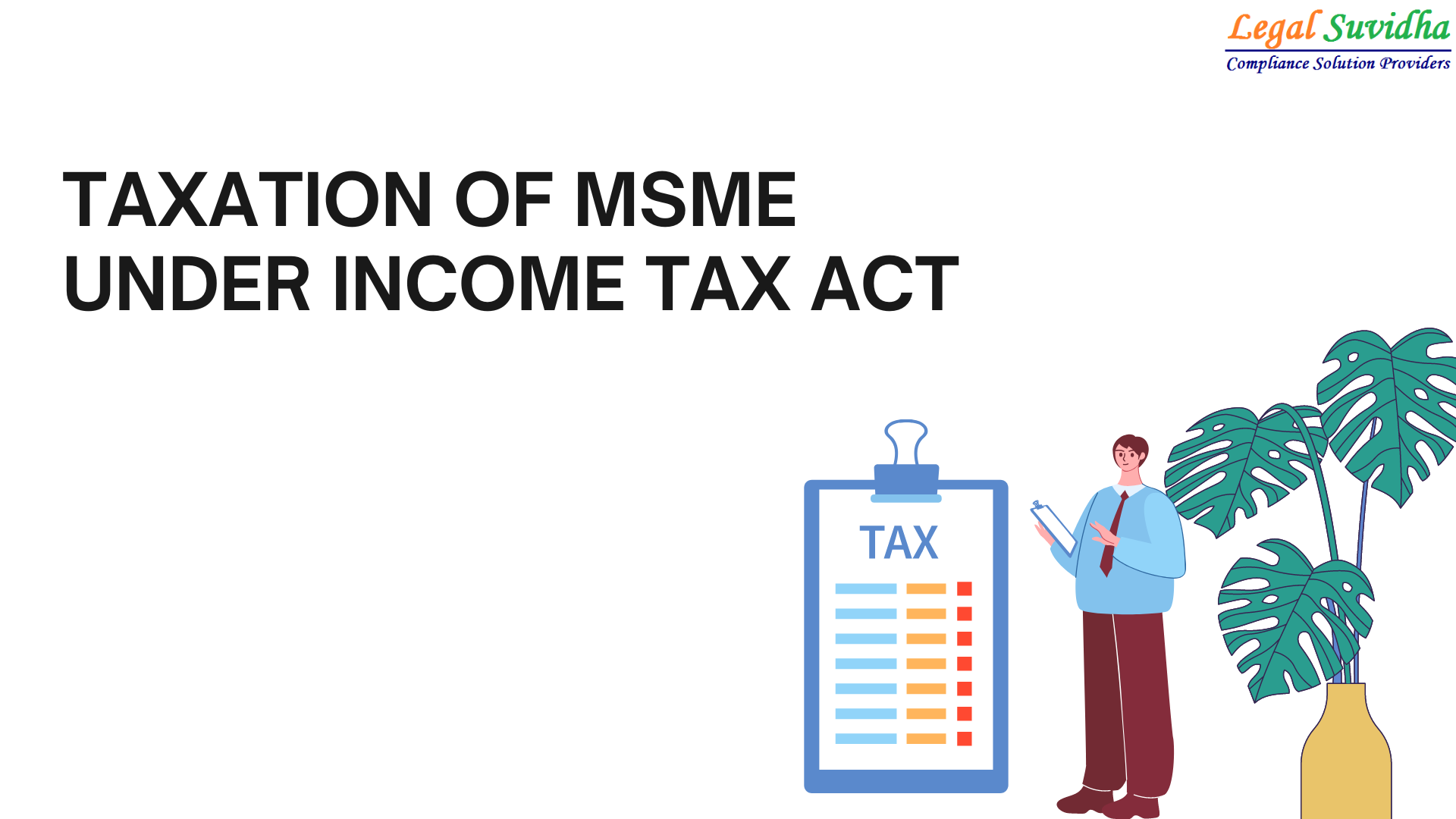TAXATION OF MSME UNDER INCOME TAX ACT,1961
OVERVIEW:
MSME is the abbreviation used for Micro, small and medium enterprises. MSM Enterprises or small-scale industries (SSIs) are like a backbone of the economy of the developing country like India. The growth of these industries directly impacts the growth of the Indian economy in a positive way. Whether the company deals in manufacturing or services, it can obtain MSME registration. Although it is not mandatory to apply for MSME registration but getting a business registered under MSME provides numerous benefits like credit facilities, loans, taxation, setting up the business, etc.
Micro, Small and Medium Enterprises (MSME) sector was established to facilitate, develop and promote the competitiveness of the micro, small and medium enterprises and it has emerged as a dynamic sector of the Indian economy over the last sixty years
Benefits of MSME Registration:
- The cost of setting up an industry and getting a patent registered has become way too cheaper as there are many concessions and rebates available.
- The interest on bank loans is very low, somewhere 1 to 1.5 % which is much lower than normal routine loans.
- Collateral-free loans from banks
- Beneficial reservation policies in the manufacturing/production sector
- Concession in electricity bills
- Direct tax laws rules exemption
- Waiver of stamp duty and registration fees
- The credit for Minimum Alternate Tax(MAT) can be carried forward for up to 15 years instead of 10 years.
- One can easily acquire government tenders as the MSME portal is linked with various other govt. portals which makes it easy to get the marketplace.
- There is a one-time settlement fee for non-paid amounts of MSME
Following are the important provisions of Income Tax Act 1961 and Finance Act 2022 with respect to the above types of organizations.
1. Sole Proprietorship concern
a. It can opt either Old regime of taxation or New regime(Sec 115 BAC) of taxation.
b. Alternate Minimum Tax (AMT) will be applicable in certain special cases
c. Following are the important deductions which can be claimed as per Chapter VIA (If it opts the regime of taxation)
I. Sec 80 CCC .II. Sec 80 CCD III. Sec 80 E IV. Sec 80EE V. Sec 80 GG VI. Sec 80 QQB .VII. Sec RRB. VIII. Sec 80 TTB. IX. Sec 80 U X. Sec 80 C .XI. Sec 80 D.XII. Sec 80 DD .XIII. Sec 80 DDB .XIV. Sec 80 G.XV. Sec 80 GGA .XVI. Sec 80 GGC .XVII. Sec 80 IA .XVIII. Sec 80 –IAB .XIX. Sec 80-1C .XX. Sec 80-IE XXI. Sec 80-1B .XXII. Sec 80 JJA .XXIII. Sec 80 JJAA. XXIV. Sec 80 CCF
2. Hindu Undivided Family
a. It can opt either Old regime of taxation or new regime (Sec 115 BAC) of taxation.
b. Alternate Minimum Tax (AMT) will be applicable in certain special cases
c. Following are the important deductions which can be claimed as per Chapter VIA (If old regime of taxation opts). I. Sec 80 C II. Sec 80 D III. Sec 80 DD. IV. Sec 80 DDB V. Sec G .VI. Sec GGA VII. Sec GGC .VIII. Sec 80 IA .IX. Sec 80 IB. X. Sec 80 IAB .XI. Sec 80 IC X. Sec 80 IE .XI. Sec 80 JJA XII. Sec 80 JJAA. XIII. Sec 80 TTA
3. Partnership Firms
a. Two types of taxation
i. As per sec 184
ii. Firms which do not comply with sec 184
b. A Flat Income tax rate of 30% on total income of the firms is to be paid by the firms
c. Alternate Minimum Tax (AMT) will be applicable in certain special cases
d. Following are the important deductions which can be claimed as per Chapter VIA. I. Sec 80G .II. Sec 80GGA .III. Sec 80GGC .IV. Sec 80 IA .V. Sec 80 IB. VI. Sec 80 IAB .VII. Sec 80 IC .VIII. Sec 80 IE .IX. Sec 80 JJA X. Sec 80 JJAA.
4. Limited Liability Partnership Firms
As per the Limited Liability Partnership Act 2008. Income tax Assessment is as same as the assessment of the partnership firms
5. Private Limited Companies and Public Limited Companies as per Indian Companies Act 2013.
Companies can opt for assessment as per anyone of the following section
i. Old regime of taxation
ii. Sec 115 BA
iii. Sec 115 BAA
iv. Sec 115 BAB MAT is not applicable @15% in the case of company opts taxation under the following sections.
i. Sec 115 BAA
ii. Sec 115 BAB
Following are the important deductions that can be claimed as per Chapter VIA if the company opts taxation under the old regime
I. Sec 80G .II. Sec 80GGA .III. Sec 80GGC .IV. Sec 80 IA .V. Sec 80 IB. VI. Sec 80 IAB .VII. Sec 80 IC .VIII. Sec 80 IE .IX. Sec 80 JJA X. Sec 80 JJAA. XI. Sec 80 GGB XII. Sec 80 LA XIII. Sec 80 PA
6. Co-operative Societies as per Indian Co-operative societies Act or the State Co-operative societies Act.
a. It can opt either Old regime of taxation or new regime (Sec 115 BAD) of taxation.
b. Alternate Minimum Tax (AMT) @15% will be applicable in certain special cases
c. Following are the important deductions which can be claimed as per Chapter VIA (If old regime of taxation opts)
I. Sec 80G .II. Sec 80GGA .III. Sec 80GGC .IV. Sec 80 IA .V. Sec 80 IB. VI. Sec 80 IAB .VII. Sec 80 IC .VIII. Sec 80 IE .IX. Sec 80 JJA X. Sec 80 JJAA. XI. Sec 80 P







